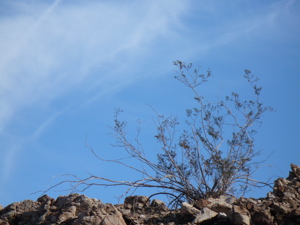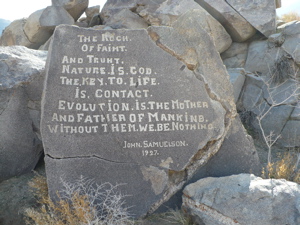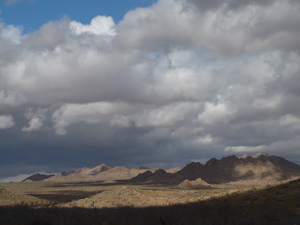You are currently browsing the monthly archive for February 2009.
Does beauty reduce to necessity? The Darwinian answer is “yes.”
Donald Culross Peattie wrote, “You may pretend so if you like, but it is not demonstrable.”
He wrote those words in An Almanac for Moderns in 1935. A nature writer could write such things in 1935, but today I think it is harder for one to say this.
The possibility that the struggle for existence is not sufficient to explain beauty worried Darwin. He worried that it is not demonstrable.
It is a pity that the view of evolution named Darwinian today does not reflect the full careful thought and wisdom of the man whose name it bears.
I think Peattie is right – we pretend that we believe beauty reduces to necessity. I wonder why we pretend so? It may be that through science we have learned to overcome the great power of chance and necessity, but if beauty is something else, something free, then its power must be awfully great, just as poets say. It may never yield its secret, its freedom, to us.
In “The Holy Earth” (1915) Bailey wrote about evolution: “This is the philosophy of the oneness in nature and unity in living things.”
About the morality or immorality of the struggle for existence that is the instrument of natural selection, Bailey wrote: “If one looks for a moral significance in the struggle for existence, one finds it in the fact that it is a process of adjustment rather than a contest in ambition.”
It is, in Bailey’s estimation, morally significant that natural selection is not driven by ambition or purpose. By the expression “process of adjustment” I doubt that Bailey meant to offer an alternative teleology for the struggle. I think he understood that evolution, as understood in science, has no purpose, no meaning in a teleological way. If one removes the idea that life has purpose, then the character of morality must change, if it is to remain significant at all.
For Bailey, I think his expression “The Brotherhood Relation” defines morality, if the word morality even applies. I think the word eschatology applies here more than the word morality. The Brotherhood Relation is something that comes after the era of natural selection, after the era in which survival, the adjustment process, is tied to the instinct to kill. He wrote: “It is exactly among the naturists that the old instinct to kill begins to lose its force and that an instinct of helpfulness and real brotherhood soon takes its place.” That is an eschatological belief, rather than a moral belief. It is a vision of a new era. It is eschatological in the way Isaiah wrote – the wolf shall dwell with the lamb (Isaiah 11:6-9.) It is a vision of Zion, of God’s holy hill, of “The Holy Earth.”
Eschatology and evolution merge to form ecology in the writings of Liberty Hyde Bailey. In ecology, evolution sings the song of Zion.

John Burroughs wrote: “Natural selection is just as good a god as any other. No matter what we call it, if it brought man to the head of creation and put all things (nearly all) under his feet, it is god enough for anybody.” That is an allusion to Genesis 1:26 and Psalm 8:6.
Can stoicism overcome the nihilism associated with Darwin’s view, overcome what Burroughs called “the cosmic chill.” I think Burroughs believed stoicism would warm us. He wrote that “most persons feel homeless and orphaned in a universe where no suggestion of sympathy and interest akin to our own comes to us from the great void.” And then, in a sentence that alludes to Psalm 8:3-4 and to Darwin’s great work, he wrote: “A providence of impersonal forces, the broadcast, indiscriminate benefits of nature, kind deeds where no thought of kindness is, well-being as the result of immutable law – all such ideas chill and disquiet us, until we have inured ourselves to them.”
Inure: this is the counsel of stoics.
Burroughs wrote these lines in a work he titled stoically, “Accepting the Universe: Essays in Naturalism” (1920.)
Thoreau had already famously written, “In wildness is the preservation of the world.” They are related, I think – wildness and natural selection. Still, I am not sure Thoreau meant it that way. Although some critics have suggested that wilderness or nature was Thoreau’s god, and that a Zen theme (which is a stoical theme) can be detected in some of his writings, I think wildness was not natural selection to him – wildness was the opposite of civilization. Thoreau was engaged in resistance, not acceptance. In wildness was hope to him.
For me, stoicism fails. Resistance is my path. Resistance, and, like the psalmist and Thoreau, hope that we will find sympathy, kindness in the wildness in or beyond the moon and the stars.

Quail is a high desert mountain, the highest in Joshua Tree. On a clear day one can see a hundred miles. On this day, we could see a hundred feet, and in the cloud the colors of the land and our own colors faded.
Without a trail and with the mountain in the cloud, we followed coordinates in our GPS units and the memory of one who had found the way on a clear day several years ago.
Two layers of gloves were not enough to keep my wife’s fingers warm in the cold wind and sleet. She wore my extra windbreaker over her own jacket so the long sleeves would cover her hands.
I tried to keep my lips dry so the moisture on them would not freeze.
Wind gusts of about 30 miles per hour threatened our balance.
Why did we start this journey and why did we persist? Reason has no answer; nor does the soul. Mary Austin wrote that souls fade at their edges in this land. They do.

“Evolution is the mother and father of mankind,” he wrote. I wonder what he meant. I wonder if he believed what Darwin believed, that evolution works by chance and necessity. Did he mean to say that humans have nonhuman ancestors, or did he mean to say that we came to be by chance and necessity. I wonder what “nature” meant to him – what he meant when he wrote, “Nature is God.”
Was it in his mind that we are nothing but the stuff of chance and necessity? And if it was, why did he engrave these words on stone? How did he feel?
The following photograph shows the view looking north across the desert valley east of Samuelson’s Rocks. What did it mean to John Samuelson?


Recent Comments